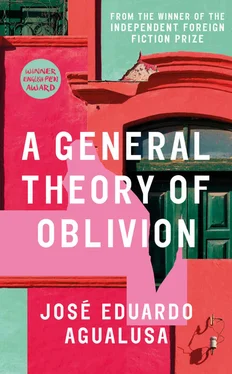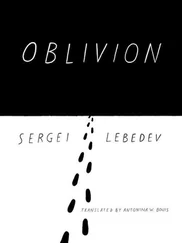They didn’t come back to Portugal after Angola’s Independence. The Portuguese consulate in Luanda has no record of any of them either. I’m presuming to write to you in order to find out whether your newspaper might in any way be able to help me find Ludovica Fernandes Mano.
Respectfully yours,
Maria da Piedade Lourenço
Phantom died in his sleep. In his last weeks he had been eating very little. To tell the truth, he had never eaten much — there wasn’t much to eat — which perhaps explains how he had lived so long. Laboratory experiments show that the life expectancy of mice increases considerably when they are given a low-calorie diet.
Ludo woke up, and the dog was dead.
The woman sat down on the mattress, opposite the open window. She hugged her thin knees. She lifted her eyes towards the sky, where, bit by bit, pink, light clouds were forming. Chickens clucked on the terrace. The crying of a child rose up from the floor below. Ludo felt her chest emptying. Something — some dark substance — was escaping from inside her, like water out of a cracked vessel, slipping down onto the cold cement. She had lost the only creature in the world who loved her, and she had no tears to cry.
She stood up, chose a piece of charcoal, sharpened it, and attacked one of the walls, which was still clean, in the guest bedroom:
Phantom died tonight. Everything is so useless now.
The look in his eyes caressed me, explained me and sustained me.
She climbed up to the terrace without the protection of the old cardboard box. The day was unfurling itself, a warm yawn of a day. Maybe it was Sunday. The streets were almost deserted. She watched a group of women walk past dressed in pristine white. One of them, spotting her, raised her right hand in a joyful greeting.
Ludo drew back.
She could jump, she thought. Step forward. She could climb out onto the ledge, so simple.
The women, down there, would see her one moment — a feather-light shadow — hovering a second and then falling. She stepped back, went on stepping back, cornered by the blue, by the vastness, by the certainty that she would go on living, even with nothing to give life any meaning.
Death circles around me, shows its teeth, snarls. I kneel down and offer it my bare throat. Come, come, come now, friend. Bite. Let me go. Oh, you did come today and you forgot me. _ _ _ _ _ _ _ _ _ _ _ _ _ _ _ _ _ _ Night-time. It’s night-time again. I’ve counted more nights than days. _ _ _ _ _ _ _ _ _ _ _ _ _ _ _ _ _ _ _ _ The nights, then, and the clamour of the frogs. I open the window and see the lagoon. The night that has split in two. _ _ _ _ _ _ _ _ _ _ _ _ _ _ _ _ _ _ It rains, everything overflows. At night, it’s as though the darkness were singing. The night rising up in waves, devouring the buildings.
I think, once again, of that woman to whom I returned the pigeon. Tall, prominent bones, with that slight disdain with which very beautiful women make their way through reality. She walks through Rio de Janeiro, along the bank of Lagoa (I’ve seen photographs, I found several illustrated books about Brazil in the library). Cyclists pass her. The ones who let their gaze linger on her never come back. The woman is called Sara, I call her Sara.
She looks like she’s out of a canvas by Modigliani.
ABOUT GOD AND OTHER TINY FOLLIES
I find it easier to have faith in God, notwithstanding His being something so far beyond our incredibly limited understanding, than in arrogant humanity. For many years, I called myself a believer out of sheer laziness. It would have been hard to explain my non-belief to Odete, to everyone else. I didn’t believe in men either, but that was something people accepted easily. I have understood over these last years that in order to believe in God, it is essential to have trust in humanity. There is no God without humanity.
I continue not to believe — neither in God, nor in humanity. Since Phantom died I have worshipped His spirit. I talk to Him. I believe that He hears me. I believe this not through an effort of the imagination, still less intelligence, but by engaging another faculty entirely, which we might call unreason.
Am I talking to myself?
Perhaps. Just like the saints, by the way, who boasted about talking to God. I’m less arrogant. I talk to myself, believing that I’m talking to the sweet soul of a dog. In any case, these conversations do me good.
I carve out verses
short
as prayers
words are
legions
of demons
expelled
I cut adverbs
pronouns
I spare my
wrists
THE DAY LUDO SAVED LUANDA
On the living room wall there hung a watercolour depicting a group of Mucubals dancing. Ludo had met the artist, Albano Neves e Sousa, a fun, playful kind of guy, an old friend of her brother-in-law’s. She couldn’t stand the picture at first. She saw in it a distillation of everything she hated about Angola: savages celebrating something — some cause of joy, some glad omen — that was quite alien to her. Then, bit by bit, over the long months of silence and solitude, she began to feel some affection towards those figures that moved, circling around a fire, as though life really deserved such elegance.
She burned the furniture, she burned thousands of books, she burned all the paintings. It wasn’t until she was desperate that she took the Mucubals down off the wall. She was going to pull out the nail, just for aesthetic reasons, because it looked wrong there, serving no purpose, when it occurred to her that maybe this, this piece of metal, was holding up the wall. Maybe it was holding up the whole building. Who knows, if she pulled the nail out of the wall, the whole city might collapse.
She did not pull out the nail.
APPARITIONS, AND A NEARLY FATAL FALL
November passed, cloudless. December too. February arrived and the air was cracked with thirst. Ludo saw the lagoon drying out. First it darkened, then the grass turned gold, almost white, and the night-time lost the uproarious noise of the frogs. The woman counted the bottles of water. Not many left. The chickens, which she gave the muddy water from the swimming pool to drink, fell sick. They all died. There was still corn left, and beans, but to cook them used up a lot of water, and she needed to save it.
She went hungry again. One morning she got up early, shaking off her nightmares, staggered into the kitchen, and saw a bread roll on the table:
‘Bread!’
She picked it up in disbelief, with both hands.
She smelled it.
The scent of the bread carried her back to her childhood. She and her sister, on the beach, splitting some bread with butter. She bit into it. It was only when she had finished eating that she realised she was crying. She sat down, trembling.
Who could have brought her that bread?
Maybe someone had thrown it through the window. She imagined a broad-shouldered young man hurling a loaf of bread into the air. The bread tracing a slow arc, before landing on her table. The person in question might have thrown the bread up into the sky from the lagoon, which was now almost dry, as part of some mysterious ritual aimed at summoning the rain. A Quimbanda witch doctor, a real champion bread-thrower, since it was a quite considerable distance. That night she fell asleep early. She dreamed an angel had visited her.
In the morning she found, on the kitchen table, six bread rolls, a tin of guava jelly and a large bottle of Coca-Cola. Ludo sat down, her heart racing. Someone was coming in and out of her house. She got up. In recent months her eyesight had been getting worse and worse. No sooner had the light begun to fade, after a certain time of the day, than she began to move about just by instinct. She went up onto the terrace. She ran across to the building’s right-hand façade, the only one without any windows, which faced another block just a few metres away. She leaned over and saw the scaffolding, which surrounded the neighbouring building, right up against her own. That was how the invader had come in. She went down the stairs. It might have been because of her nerves, or because of the lack of light, but whatever the reason, her instinct failed her, she missed a step and tumbled, flailing. She fainted. The moment she had recovered her senses she knew she had fractured her left femur. So that’s how it’s going to be, she thought. I’m going to die not the victim of some mysterious African affliction, not through lack of appetite or exhaustion, not murdered by a thief, not because the sky has fallen on my head, but conspired against by one of the most famous laws of physics: Given two bodies of mass m1 and m2, and a distance r between them, these two bodies will be attracted to each other with a force proportional to the mass of each and inversely proportional to the square of the distance that separates them. She had been saved by her lack of mass. Twenty kilos more and the impact would have been devastating. Pain climbed up her leg, paralysing the left side of her torso, preventing her from thinking clearly. She stayed immobile for quite some time, while night twisted about out there, like a boa constrictor, choking the harassed acacias on the streets and squares. The pain was barking, the pain was biting. Her mouth felt dry. She tried to spit out her tongue, because it was as though it didn’t belong to her, a piece of cork trapped in her throat.
Читать дальше












